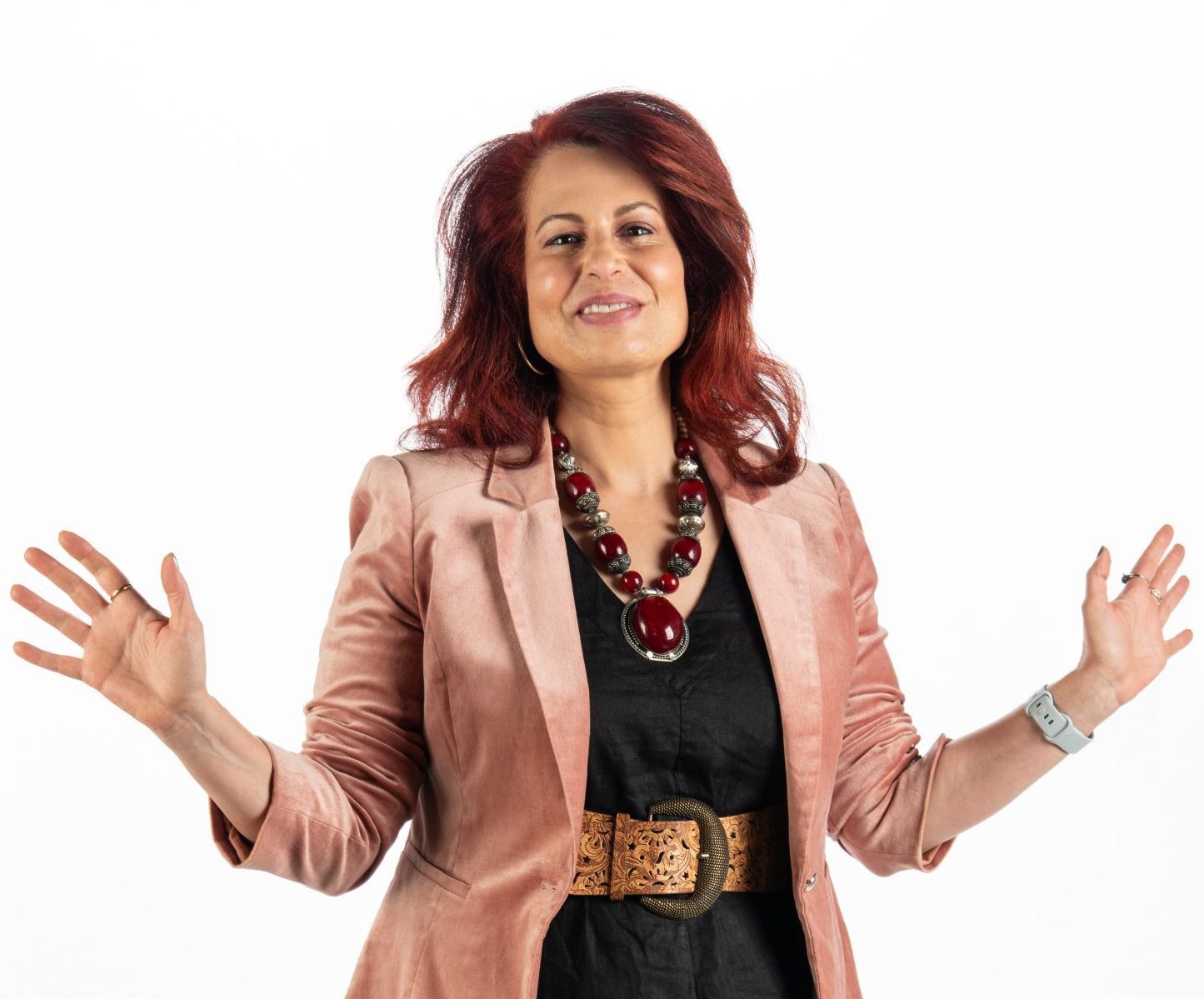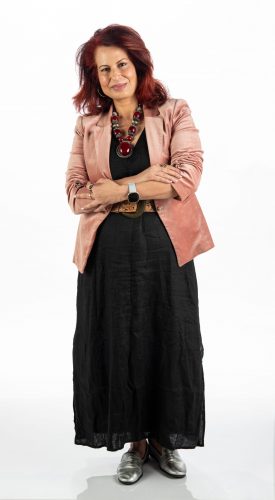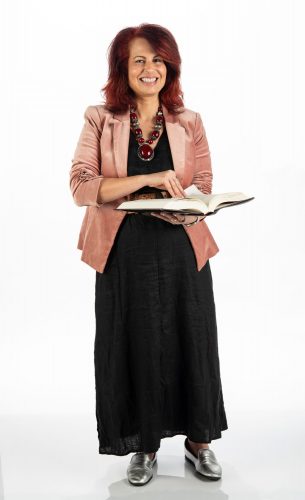Woman as Guru
Antoinette DeNapoli is advancing the understanding of female empowerment in patriarchal religions.

Antoinette DeNapoli, TCU's John F. Weatherly Professor of Religion, advances understanding of female empowerment in patriarchal religions.
Woman as Guru
Antoinette DeNapoli is advancing the understanding of female empowerment in patriarchal religions.
Antoinette DeNapoli, TCU’s John F. Weatherly Professor of Religion, studies women’s leadership in Hinduism. Her travels to South Asia continue to impact her research and worldviews by fostering connections possible only through sustained, direct experience.
Did you grow up in a religious household? What did your personal experiences with religion at a young age mean to you, and why were you curious to expand your wisdom and knowledge in this area?
I grew up in a religious household from a Roman Catholic background, and my mother is devout; she has a shrine to the Virgin Mary. I haven’t been a practicing Catholic since after my confirmation because I found that church to be very patriarchal. I could not accept the blocking of women from achieving higher institutional status in the religion.
I didn’t start out wanting to study religion. I ended up taking a religion class in college that changed my life forever. I took as many courses as I could in religious studies and loved studying Hinduism and its gods and goddesses. I loved going to the Hindu temples and meeting with Hindu priests who all encouraged me to study Sanskrit. From there, I just kept going deeper and deeper into the study of Hindu religions and other religions.

Antoinette DeNapoliI was at the University of Wyoming when said said she “saw the position for an associate professor of South Asian religions with an emphasis on Hinduism. I left that institution for TCU, which I will always be grateful for.”
What attracted you about teaching religion at TCU?
I was an associate professor at the University of Wyoming when I saw the position for an associate professor of South Asian religions with an emphasis on Hinduism. I left that institution for TCU, which I will always be grateful for. TCU is exemplary in the way it emphasizes taking care of each other, which was a major draw for me because I was coming from a culture in the western part of the United States where the mantra was cowboy up, meaning you’re basically on your own and can’t show any weakness. I was tired of feeling isolated, and I wanted to feel nurtured again. I wanted to be at an institution where humanities are deeply respected and integral to what it means to be human.
Why is religion an important part of a well-rounded education?
Religion is a feature of everyday human life and permeates the layers of our consciousness deeper than we could ever imagine. Religion is anything that helps people confront their worst selves to become their best selves and serve society. Religion is about individual transformation, but it requires societal change.
Society is not going to change itself because it doesn’t exist apart from the individual. The study of religion is about exploring the connection between the individual and community. How can you be human without being influenced, informed and inspired by religion?
Many of your publications focus on women in Hinduism. What inspired you to direct your research toward women?
I study women because I refuse to equate the male with normativity. I am committed to illuminating how being a woman makes a difference at the level of religious experience, practice, identity, authority and being. I am following in the footsteps of earlier feminist scholars of religion. Even today in the 21st century, there are scholars who think studying women is boring and approach the study of women as if they’re unicorns.
For centuries, the female body has been considered so polluting that a woman could never ritually be pure enough to perform the practices that religious leaders are expected to do. Much of the primary text material is filled with this kind of negative attitude about the female body. My work is corrective. My work is not only about balancing representations of women in the field with actual lived practices, but it is also about pushing back at my colleagues in the field who still believe studying texts is more important than studying people.
How is traveling an essential part of your research?
Traveling is absolutely vital to what I do. How is traveling an essential part of your research? I started traveling to India in 2001 and spent 11 weeks studying intermediate Hindi. I fell in love with India: with the people, customs and culture. No matter how good the scholar is, nobody can capture what India is in a sentence, image or a word. I realized it was something you can never know fully because it’s always changing. I have a relationship with India, and that relationship is maintained through regular contact. I talk to holy people on WhatsApp and Skype.
I don’t take anything for granted. I don’t assume that I already know what India is about simply because I travel there regularly. I feel like I’m a sponge, always absorbing new elements of the culture because we’re dealing with a living, breathing organism.
In your article “Can a Woman Be a True Guru,” published in Feminist Encounters in March 2023, you followed two religious women, Mataji and Anandmai, who are advocating for Hindu women’s rights. How did you become connected to these women?
I start with a story about Mataji’s experience of being bullied by a male religious leader. I met Mataji in 2014. She created a new women’s monastic order at one of India’s largest religious gatherings, which is known as the Kumbh Mela. I contacted her and traveled to Allahabad and Pradesh. I stayed with her for nine days, living at her ashram and sleeping on the floor. My relationship with the other guru, Anandmai, is recent. I met her in 2019 at the Kumbh Mela. I noticed a camp being organized by a female guru. She liked me and kept inviting me back. I talked to her and participated in some of the events that were happening at her camp. She invited renowned, educated female spiritual leaders to teach other women. She was initiating women into roles at very high levels of influence, which in the conventional male monastic structure women are not allowed to do. These women are creating spaces for their own authority, even when it’s not institutionally sanctioned.

Antoinette DeNapoli said that the most rewarding moments from her research come “when students tell me they like what I write or start using the vocabulary that I teach them.”
You’ve studied the necessary qualifications of Hindu religious leaders. What qualities make women powerful Hindu leaders, and what religious beliefs keep women from achieving higher religious titles?
I’m studying female religious leaders, particularly monastic gurus who are using their power to gain more rights for women in religious society. In conventional Catholicism, we have the highest official position, which is that of the Pope and papal authorities, which has only been held by men. Within the monastic societies of Hindu of Hinduism, you have what is known as the Shankaracharya, the master teacher. This teacher is in the lineage of the original teacher, who has been given the power to lead from a deity, revelation or textual knowledge.
I am working with women who are trying to create new rules for women as Shankaracharyas. They’re doing this by claiming to receive revelation from Hindu deities. In the latest article I published in June in the Religions journal, “Everyone Drinks from the Same Well,” I looked at two women who receive revelation from a goddess. They were told by the goddess to appoint themselves as Shankara to raise the status of women and heal the misogyny of monastic culture.
What do you believe is the biggest threat to women and girls in South Asia?
Male chauvinism, ignorance and gender-based oppression are the greatest threats. Male chauvinism is a way of seeing the world as if one thinks one knows better than somebody else simply because they are a male. It really comes down to authority. Who is the authority and who has the right to speak for women? How much longer will women have to prove themselves worthy of making their own decisions? We see these kinds of battles taking place all over the world and in every social sphere.
What is the rewarding moment when you realize your research is making a difference?
When students tell me they like what I write or start using the vocabulary that I teach them. When students use the words, I know it’s becoming part of their consciousness and thinking. They can forget the term, but they’ll always have the framework.
What do you hope for the future of South Asian religious studies?
I hope more students will consider religion a worthy field of investigation. The future is with our students because the field will only last for as long as it has people to populate it. One of my fears is losing religion majors. The study of religion is absolutely crucial in helping all of us to make sense of human motive. Religion is an explanation of the meanings of people’s actions and behaviors in the world. Therefore, the study of religion and religious cultures can help us avoid repeating the past. Whether it’s doing something good or engaging in a form of violence, religion is an explanation of the meanings of people’s actions and behaviors in the world.

Your comments are welcome
Comments
Related reading:
Research + Discovery
Prescriptions for Chronic Inequities
TCU researchers seek to close gaps in health care access and outcomes for underserved people.
Research + Discovery
Paging Through History
A project to catalog a Jewish collection at the TCU library uncovers a mystery in a medieval manuscript.
Features, Research + Discovery
The Music of Mexico
Laura Singletary’s deep dive into a high school’s mariachi program spurred the start of one at TCU.